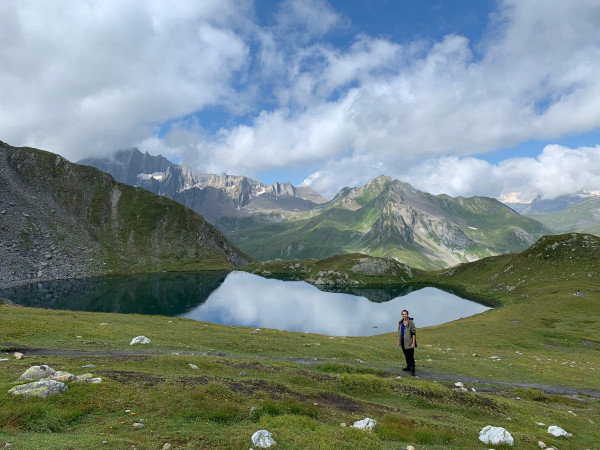Linda Mauron
Interviewed by Carey Sargent, EPFL, NCCR MARVEL in February 2023
Have you always been interested in science?
For as long as I can remember I took physics as an option, in school, in high school, and so on. I don’t know if I was always interested in science but I was always very curious about everything. I wanted to understand how everything worked. For me, physics was really the best entry for this. Pretty early on, I started looking to physics, and also to mathematics a bit, simply out of curiosity.
How did you hear about the INSPIRE Potentials Program?
I’d seen information about it since my bachelor’s and during my master’s my professor from the lab I worked in told me about it and said I could fit in. I took a look and really liked what I saw. The initiative to encourage women and so on was really fitting for me and so I tried it.

What is the topic of your master’s project?
I’m doing a simulation of a published article in which they did a real hardware experiment—I’m trying to reproduce it doing simulations using neural quantum states and variational methods, so a lot of machine learning applied to quantum physics. We’re trying to see if we can get the same results with that method because it has never been used on that topic before…at least it hasn’t worked yet.
The main topic of the experiment initially is one that could be used to build quantum computers that are very fault tolerant. That’s something that we’re investigating now and that’s why there’s interest in that topic.
Do you think women face specific challenges in the sciences?
Yes, I do. I think the main challenge is representation because we don’t see a lot of women. I recall at the beginning of the bachelor’s, it was almost half-half and now at the master’s level—I do the exercise of counting women in the classes I take—we’re never more than 30% so the numbers are really going down. That can be a challenge because you want to be able to picture yourself in that career. That is something I care about and I try to show people, also outside the academic world, that we can do it as well. There’s no difference, we can do it as well as any other person.
I know too that there can be some concrete challenges, like some people having issues with co-workers, but I have never had to deal with such problems.
Any advice for young girls interested in the field?
My advice is to stay interested and not be afraid of the overwhelming presence of men. Women can do as well and there’s no reason to not pursue it because you’re a woman. They should really try to aim for their goal because that is something very important. If you wish to do something, there shouldn’t be other people that won’t let you do what you’re passionate about.
Why do you think so many women drop out between the bachelor’s and master’s degree?
I don’t know. I know that sometimes they don’t quit, but maybe just don’t go into such theoretical areas. I’m in a pretty theoretical lab and representation is maybe an issue here because we know it’s a pretty manly sector. Maybe they chose to go into areas where it’s a bit more friendly. I don’t think that at our age we already have the problem of the career, but maybe that can be discouraging when thinking about the future. Academic careers can make it difficult to have a family and that’s still not really symmetric with regards to men and women. This might already be discouraging at the master’s level.
What are your plans for the future?
I would like to do a PhD if I can find one. I really like research and that’s very interesting for me. I’m not 100% sure yet, but maybe I could also go into teaching for younger classes, like in the gymnase (high school), to really encourage everyone to do what they want to do. That’s something that’s very important to me, to give everybody equal chances. At this level, I think I could have an influence on people.
